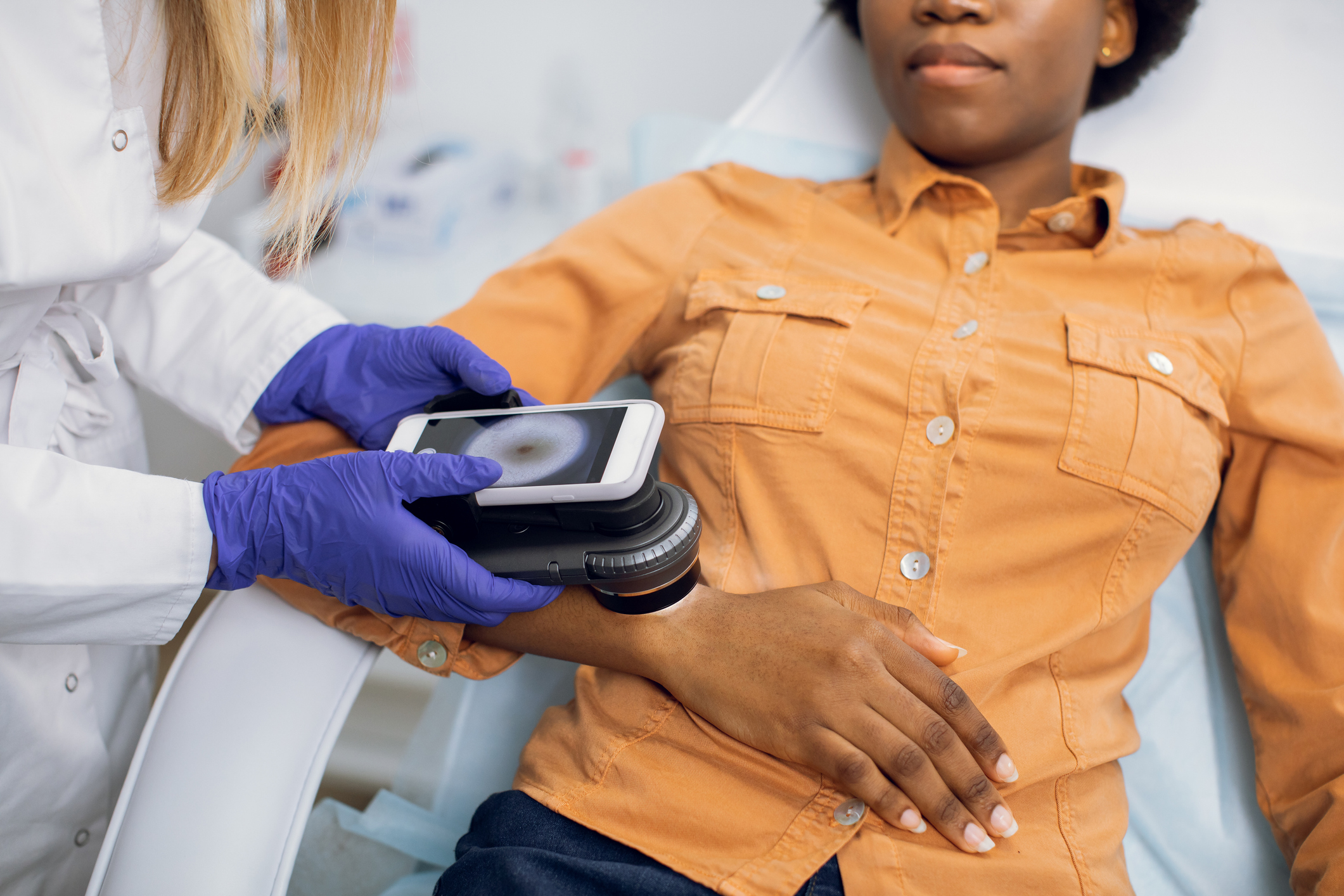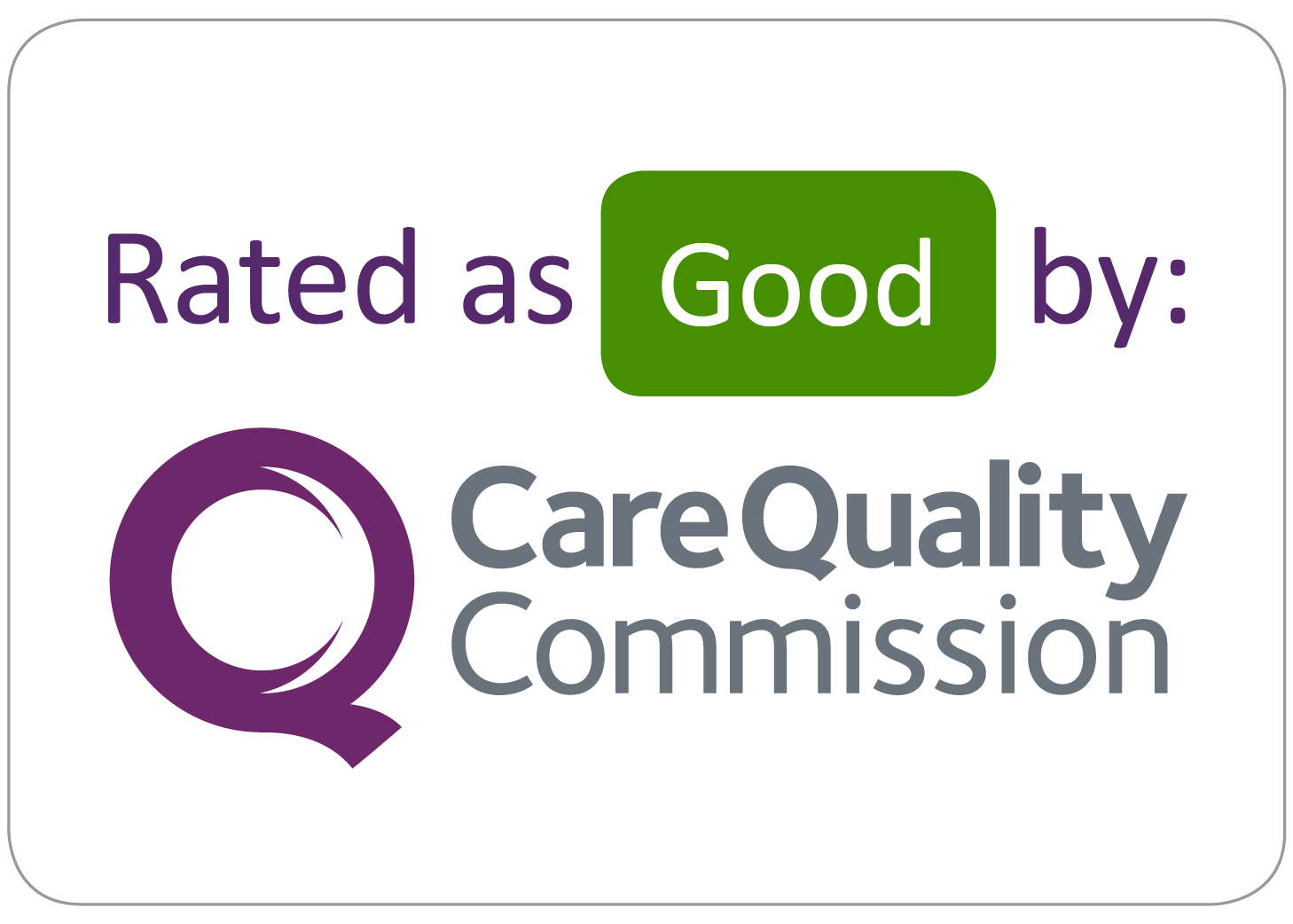Teledermatology
What is Teledermatology?

Teledermatology is the use of a camera to take high-quality photographs of skin when something unusual or new is seen for example a mole that is growing or bleeding. Your photographs will be reviewed by a clinician specialising in the study and treatment of skin conditions and a decision made as to whether you will need to be seen at a clinic at one of our hospitals.
What are the benefits of this service?
If (after your images are reviewed) your skin does not require further investigation, you will be informed through a discharge letter and will not need to attend a hospital appointment. A copy letter will also be sent to your GP.
If you need to be seen by a dermatologist, you will be contacted to arrange an appointment at Calderdale Royal or Huddersfield Royal NHS Hospitals.
Please be aware Calderdale Royal Hospital and Huddersfield Royal Infirmary also referred to as CHFT are a joint Trust running services over 2 hospitals. This means you may be offered an appointment at either hospital, which ever hospital has the earliest appointment.
What happens at my Teledermatology medical imaging appointment?
The photographer will ask for your consent to take photographs of the area of concern on your skin, one to identify the area of the body and two or more close up photographs to provide enough detail for the clinician to make a decision on next steps.
The photographs and your referral letter will then be sent electronically via a secure link to the skin cancer department at CHFT. The team will make a record in your notes that you have given consent to have the photographs taken.
For any appointment queries please contact 01422 224304 or 01422 224258
What happens after my photos are taken?
Your photographs will be carefully assessed by a clinician within 72 hours (with the exception of public holidays) of receiving them. A decision will then be made whether you need to be seen in the clinic at the hospital or not.
You may receive a notification about a triage appointment, this is the remote appointment where the images are reviewed by the clinician you do not need to attend in person for this.
For some patients, the clinician will be able to make a diagnosis from the photograph, provide reassurance and discharge you back to your GP with advice and information for looking after your condition.
Sometimes, the clinician may decide that you do need to be seen in person or that you need a biopsy (a small piece of skin is taken and sent to a laboratory for diagnosis). If a biopsy is considered, you will be contacted and offered an appointment at Calderdale Royal Hospital or at Acre Mills at Huddersfield Royal Infirmary. If you need to be seen quickly, the clinician will arrange for this to take place and you will be contacted with further information.
The clinician who reviews your photographs will write to you and your GP with the decision, so you are always kept up to date with what is happening with your care.
You should receive your results within 28 days.
Frequently Asked Questions
How are my photographs processed?
When the photographs are taken they are uploaded directly to your electronic hospital record via a system called PACS (Picture Archiving Communication System) which conforms to all NHS requirements for protecting your data. Your photographs on PACS are linked to your NHS Number.
Your referral is then sent electronically to the dermatology department at CHFT along with a brief history of your skin condition and the team will then be able to review the stored images on PACS. Your photographs will be seen by one of the expert clinicians at CHFT.
The lawful purpose of processing your photographs is for medical diagnosis. (General Data Protection Regulation (EU) 2016/679 Article 6(I) and Article 9(2)h)
What does giving my consent mean?
In giving your consent to having the photographs taken you are saying that you understand and agree to the purpose of taking the photographs, what photographs will be taken and that they will be linked to your NHS number, how they will be used, who will have access to them and how they will be stored.
You can remove consent for the use and storage of your photograph prior to the referral to the hospital, however, once the photographs have been taken, these photographs will remain part of your clinical record in line with medical records retention policy. Your photographs will be stored by Calderdale and Huddersfield NHS Foundation Trust (CHFT) in accordance with Data Protection legislation.
Does the clinician have to see me in person in order to identify what is wrong?
Not necessarily. For some patients, the clinician will be able to make a diagnosis from the photographs, provide reassurance and discharge you back to your GP. However, if the clinician has any uncertainty about the diagnosis, they may ask to see you in a face to face consultation or for further investigations.
How quickly can I expect a response?
The clinician will review your photographs within 72 hours (excluding public holidays). If you need to be seen in clinic, you will be contacted with an appointment date.
It is really important that you keep the appointment given.
If the team do not need to see you then your GP will be informed, and you will be sent a letter. This letter may take a few weeks to arrive.
Will I still need to go to hospital?
You will only need to go to hospital if the skin cancer team decide you need to be seen in person to assess your skin condition further.
What will happen if I need to go to the hospital?
Please don’t be alarmed if you are asked to come to the hospital. On most occasions, it simply means that the skin cancer team were not able to make a diagnosis from the photographs alone and has requested to see you.
We will contact you to give you an appointment. If this is by telephone the phone number for the hospital may be mobile or from a withheld number so please answer the call even if you do not recognise the number.
Your appointment at the hospital may involve a skin biopsy or removal of the area of concern. This is done under local anaesthetic (you are awake during the procedure) where a sample of the skin is taken away and looked at under a microscope to make a diagnosis. This may happen on the day of your appointment at the hospital.
What Will Happen If I do not need to go to the hospital?
You will receive a copy of the clinician’s letter, which will explain what action, if any, you need to take next.
a) It may be that you will be managed by your GP. If this is the case it will be clearly written in the letter. It is very important that if the letter says this, you call your GP practice and make the appointment so that your treatment, if any, can be started.
b) It could be that there is no further action needed and in which case you only need to go back and see your GP if you are worried or if there are any further changes in your skin condition.
Is this a safe service?
Yes, this service is safe. It is already provided in many areas of the country and in West Yorkshire especially. It is an excellent way of helping patients be seen or reassured more quickly, without losing any quality in the care received.
Who do I contact In case I have any questions?
In the first instance, please contact your GP surgery if you have any questions.
How can I access my photographs or raise concerns about the processing of my data?
A Subject Access Request gives you the right to request access to your personal information. It allows you to obtain a copy of the personal information (including Health Records) we hold about you. For any enquires or to make a request (supporting documentation will be required to verify identity) please telephone 01422 222 065 with your query, or contact us by email accesstodata@cht.nhs.uk
Additional information about skin conditions
The British Association of Dermatologists Patient Information Hub website provides a wide range of support and resources for patients and carers A-Z Conditions & Treatments - BAD Patient Hub

















